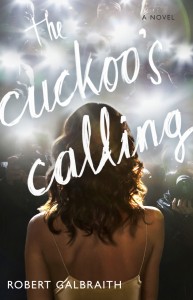I’m calling B.S.
By now you have heard about the outing of author Robert Galbraith, author of the detective novel The Cuckoo’s Calling as being by none other than Harry Potter scribe J.K. Rowling. You may have also heard about the arts editor that cracked the case. Sunday Times arts editor Richard Brooks was tipped off by friend India Knight that someone had tweeted her the information: Rowling was Galbraith. When Brooks asked Knight to point him to the tweet, it had disappeared.
 Brooks investigated and found no more information on Robert Galbraith other than he was a former military person. No pictures were available, no further biographical detail afforded. Yet Galbraith had been signed by a new literary agency who’s one big get was, as you can guess, J.K. Rowling. Brooks sent The Cuckoo’s Calling to a linguistics expert along with the most recent Harry Potter books, Rowling’s young adult novel from last year The Casual Vacancy (also the publisher of novel in question), and other random detective novels to box in the genre’s eccentricities and tropes. Rowling again comes to the top as the culprit.
Brooks investigated and found no more information on Robert Galbraith other than he was a former military person. No pictures were available, no further biographical detail afforded. Yet Galbraith had been signed by a new literary agency who’s one big get was, as you can guess, J.K. Rowling. Brooks sent The Cuckoo’s Calling to a linguistics expert along with the most recent Harry Potter books, Rowling’s young adult novel from last year The Casual Vacancy (also the publisher of novel in question), and other random detective novels to box in the genre’s eccentricities and tropes. Rowling again comes to the top as the culprit.
The publisher of The Cuckoo’s Calling was initially cagy about offering a confession. Brooks exposed the situation in the Sunday Times, Galbraith is revealed as Rowling and, presumably, sales for the “fledgling detective novelist’s” debut book are zooming off the charts, both spurred by the considerable fanbase for the author and the curiosity of this elaborate charade.
But how elaborate was it really? We have to push against some of this story’s immovables. First, The Casual Vacancy wound up being a disappointment to many. Readers were shocked by a frankness of tone that Rowling hadn’t shown in the Harry Potter books, which probably was because it wasn’t a Harry Potter book. It wasn’t nearly even the same genre, although the story revolved around young people. But having become a cult of her own, Rowling was trapped within expectations of what she was to produce, and although clearly marked as being something entirely different, it is safe to say Potterites were hoping the book in front of them would magically turn into a Harry Potter story and were not amused when it remained exactly what it was.
And actually, the demeanor of the reviews I read for The Casual Vacancy bore this out. They typically said it was a decent book, remarkable for what it was but wasn’t up to “the standard we have come to expect,” essentially. Did the book falter because it was a downbeat story written by J.K. Rowling, or just because it was a downbeat story? With this in mind, it is easy to see why someone would want to slip into the skin of someone else for their next effort, writing in an entirely different milieu with the added security of not having readership inserting magical portals into narratives where there are none. That I get.
What I do not get is the compactness of the discovery. Even before I heard about Brooks and Knight’s mysterious “Deep Throat” tweet, I asked myself how anyone in their right mind could take that logic leap from male detective novelist to J.K. Rowling. By that stretch, you could presume almost everything could be ghost-written by Rowling, excepting Stephen King/Richard Bachmann – Evan Hunter/Ed McBain books. To make such a wild hunch and have it be correct is as far-fetched as it gets. In that, the mystery tweet premise helps this ruse be more credible, but not by much.
It means that someone out there did make that leap and blabbed it to someone casually chatting about The Cuckoo’s Calling on Twitter…being generous of course. Being cynical, as I am wont to be, it was a plant. Someone put that information out for a reason. The publisher? Most likely. I mean, you are running a company that has put out a book that’s getting very good reviews — arguably better reviews than J.K. Rowling’s The Casual Vacancy got — and the sales are marginal. This thing would shift a hell of a lot more units if people knew it was a Rowling book. But rather than pulling a grand tarp off the facade in a press conference, a scam is conducted and newspaper man sniffing a story is made an unwitting patsy in a marketing ploy. That’s scenario one.
Scenario two is that Rowling, the publisher and the newspaper man are all in cahoots. Rotten in Denmark, I tells ya!
Scenario three is that Rowling outed herself. Now cleared of the pressure created by her own fame, critics are on record as saying The Cuckoo’s Calling is a good book, and all she need do now is swoop in and say, “Told ya, suckers.” Not that anyone doubted her skills, but it must be an awful thing when your success mythology stereotypes you for life. By being Galbraith, she could be like Rowling on Potter Book One, unconstrained and uncontested, a blank slate onto which the critique can be a little less biased.
 The bottom line is that the book is now going to sell the proverbial butt-load of copies and people are going to get seriously paid for the efforts of this “newcomer.” The downside is that it only amplifies what actual newcomers have to fight against all their working lives. Think about it: how likely is it that a real Robert Galbraith would have ascended to the public and professional spires of a Rowling on the merit of his writing alone? Not bloody likely.
The bottom line is that the book is now going to sell the proverbial butt-load of copies and people are going to get seriously paid for the efforts of this “newcomer.” The downside is that it only amplifies what actual newcomers have to fight against all their working lives. Think about it: how likely is it that a real Robert Galbraith would have ascended to the public and professional spires of a Rowling on the merit of his writing alone? Not bloody likely.
The Kindle and e-publishing have created more venues for young writers to succeed, but much like the independent music industry, they will forever swim as a big fish in little ponds. I will not make an exception for the Fifty Shades Of Grey phenomenon, the “mommy porn” series created by indie novelist E.L. James. (who has clearly patterned her persona against Rowling, if not her subject matter). Look, if in this day and age you can’t make money off of sexually explicit depictions of nipple-twisting and gimp suit romps, you’re not ball-gagging your audience tight enough. Both the Twilight series and the Hunger Games series succeeded because they were published as young adult books and were injected into public schools. That’s not casting doubt on if these books are good or bad. That’s for the individual to decide, but I doubt the fanaticism that has sprung up around them would have existed had they solely been introduced into the marketplace, rather than being ushered in to a captive audience.
Without the delivery system of a Scholastic Books which, not surprisingly, launched Rowling’s fame in the U.S. with the Potter series and duplicated that with Stephanie Meyer’s Twilight, or without the pseudo sex-fantasy bent that James peddles, new authors have to rely strictly on the quality of the story to garner their audience. Even Robert Galbraith alone couldn’t have made it, so while this concocted situation initially comes off as a bit of fun, the after effect reeks of that B.S.– J.K. Rowling has managed to have both the fairness of anonymity and the mega-success of the brand name all at once. She deserves credit for stretching out and creating a sharp read that people ought to try for that reason, but instead will try because it is her book. That has effectively sucked the oxygen out of a room full of “real Galbraiths” out there.
In the end, I can’t help but feel ambivalent about how this caper went down, and the negative implications it has for young, unknown authors out there.





Comments